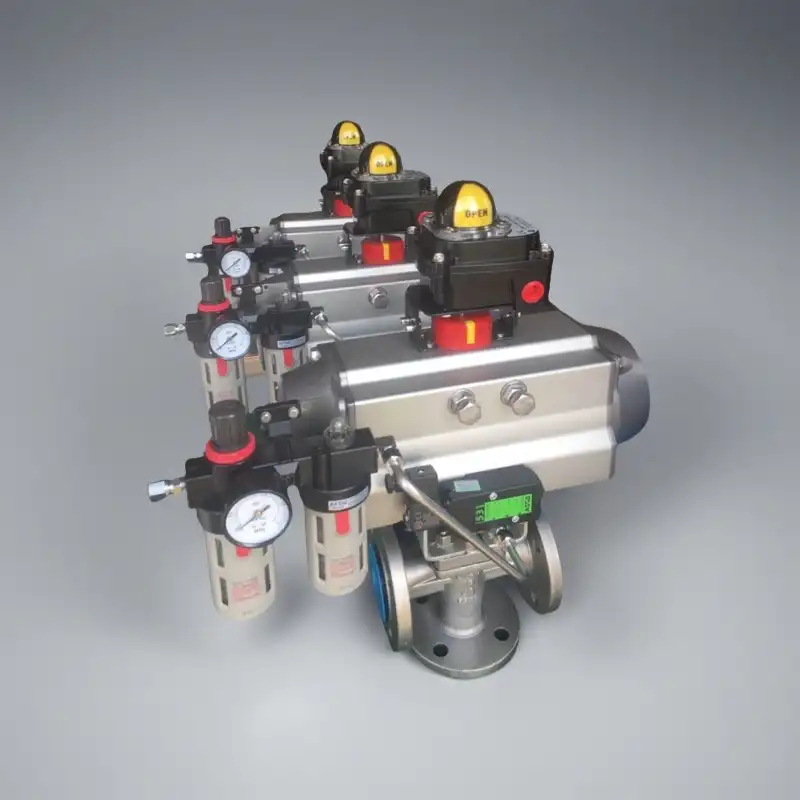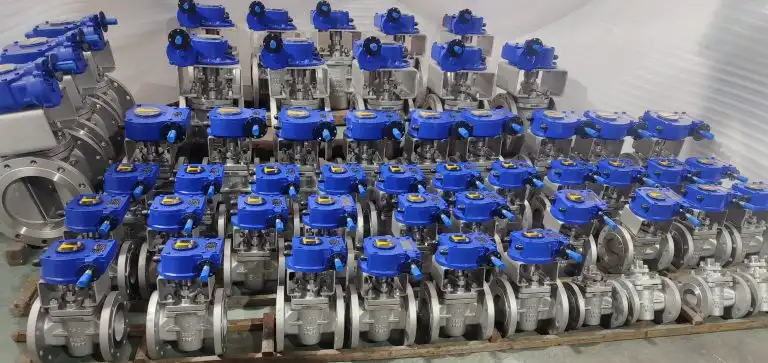Use of Plug Valves in Process Industries: Functionality and Benefits

What Are Plug Valves and How Do They Operate?
Plug valves are quarter-turn rotating valves. They are built for fast closing and very little pressure drop. Their simple yet strong build allows effective flow management in pipes across many industries.
Basic Structure and Parts of Plug Valves
Plug valves are valves that turn a quarter circle. They use a round or cone-shaped plug to control liquid movement. The plug has one or more hollow paths going through it. Liquid passes through when these paths line up with the pipe. The valve body holds the plug. It has sealing areas to make sure it closes tightly.
The main pieces are the valve body, plug, stem, and sealing rings or sleeves. Some plug valves also have packing glands or lubrication systems. These improve sealing and make the valve easier to turn.
Types of Plug Valves Used in Process Industries
Different plug valve builds fit special industrial needs. These include high-pressure sealing and fighting rust. Choosing the correct type gives the best results in different uses.
Lubricated Plug Valves
Lubricated plug valves have a space in the plug. This space holds a lubricant, often a sealant pushed in under force. The lubricant protects against rust and wear. These valves are good for high-force jobs. They seal very well when handling unclean or thick liquids.
Non-Lubricated Plug Valves
Non-lubricated types use a sleeve. This sleeve is made from rubbery or plastic material. It wraps around the plug. This build removes the need for adding sealant. It also means less upkeep. These valves are perfect for clean jobs where keeping things pure is vital.
Eccentric Plug Valves
Eccentric plug valves have a plug that is off-center. This plug moves into place with little touch on the seat until final closing. This reduces wear and gives a longer working life. People often use them in wastewater cleaning and slurry jobs. This is because they resist clogging.
Expanding Plug Valves
Expanding plug valves use a plug made of two pieces. This plug pushes out against the body seat. This creates a double block-and-bleed function. They are mostly used for critical isolation jobs. These jobs need zero leaks.
Miwival offers all four types of industrial plug valves—lubricated, non-lubricated, eccentric, and expanding. Each is made for particular flow control problems. These problems include high-force media, harsh chemicals, or fluids carrying sludge.
Flow Control System in Plug Valve Design
Using a plug valve means turning the handle 90 degrees. This lines up or misaligns the port openings with the pipeline. When open, liquid moves freely through the hollow path in the plug. When closed, flow stops completely. Some builds can control flow by opening the valve partway.
Miwival’s carefully cut plugs turn easily and close tightly. They do this even after many uses. This makes process systems dependable for a long time.
Why Are Plug Valves Liked in Certain Industrial Uses?
Plug valves offer clear benefits. These include fast use, small size, and simple upkeep. This makes them right for many industrial processes.
Benefits Compared to Other Valve Types
Compared to gate or globe valves, plug valves work faster. They cause less pressure drop and have a simpler build. This reduces working difficulty and upkeep costs.
Fast Use and Very Little Pressure Drop
Their quarter-turn design lets plug valves work quickly. This is great for emergency closing. Also, their straight flow path causes less swirling and pressure drop than globe or gate valves.
Small Size and Simple Upkeep
Plug valves are usually smaller than other types like ball or butterfly valves with the same ratings. Their simple build allows easy taking apart for checking or changing parts. You don’t need to remove the valve from the service lines.
Miwival designs its plug valves with modular pieces. This allows fast field repairs, cutting down system stops during upkeep.
Common Uses Across Process Industries
From oil and gas to water cleaning, plug valves play key roles. They reliably handle rough, harsh, and high-force media.
Oil & Gas
In drilling work and pipelines, lubricated plug valves are used. They seal strongly under high force and dirty conditions.
Chemical Processing
Harsh media like acids need non-lubricated or lined plug valves. These fight chemical damage while keeping purity levels.
Water Treatment Plants
Eccentric plug valves do well with sludge and water full of solids. They clean themselves while working.
Miwival provides solutions made for specific uses. These include oil refineries, chemical plants, and city water systems. This ensures top results across many industrial areas.
When Should You Pick a Plug Valve for Your System?
Choosing the right plug valve depends on liquid features, working conditions, and performance needs. This ensures long-term dependability.
Rules for Valve Choice Based on Media Features
Pick plug valves based on how well they work with the liquid type. Consider thickness, roughness, and harshness. Also think about working things like heat and pressure. For example, rough slurries need eccentric plugs. Clean gases suit non-lubricated types.
Usefulness in Hot or Harsh Places
Stuff like stainless steel bodies with PTFE liners make some plug valve models fight heat stress and chemical damage well. This is ideal for tough process conditions.
Results in On-Off and Flow Control Services
They are mainly made for on-off control. But some can control flow well over short ranges. However, long-term flow control might cause wear unless made for it.
Miwival helps clients pick right building materials. These include alloy steels or fluoropolymer linings. They base this on detailed media study. This ensures safe work under demanding conditions.
How Do Plug Valves Help Working Effectiveness?

With leak-proof sealing and little upkeep needs, plug valves improve system dependability. They also reduce working problems.
Improving System Dependability Through Leak-Proof Sealing
With few moving pieces and exact seating areas, modern plug valves seal completely. They do this even after long use. This is critical for containing dangerous liquids.
Reducing Stops with Simple Upkeep Steps
Their clear build allows fast access to inside pieces without full system shutdowns. Lubrication ports also make longer times between upkeep in lubricated types.
Toughness Under Hard Working Conditions
Special coverings like nickel plating on plugs fight wear and pitting. This is caused by rough flows or solid bits in the liquid.
Miwival’s strong build standards ensure each valve works reliably over millions of uses. This holds true even when facing harsh salt solutions or hydrocarbon mixes at high temperatures.
What Are the Key Points for Setup and Upkeep?
Proper setup and regular care are vital. They help get the longest life and best results from plug valves in industrial systems.
Rules for Good Setup Practices
People setting up should check that pipeline flanges line up before tightening bolts evenly all around. For lubricated types, adding sealant first ensures good sealing at start-up.
Regular Check and Service Needs
Regular checks should look at stem packing condition, how well the operator works (manual or automated), and signs of leaks around seals or flanges.
Fixing Common Problems with Plug Valves
Common issues include hard-to-turn handles (showing dry lubrication), leaks from worn sleeves/seals, or shaking from poor support during setup. All these can be fixed with standard service steps.
Miwival gives detailed setup guides. They also offer field help services, including start-up aid. This helps customers avoid typical setup mistakes.
Who Is Miwival and Why Pick Them as Your Plug Valve Maker?
Miwival is a trusted maker of top-quality plug valves. They offer made-to-order solutions and worldwide standards meeting for many industrial needs.
View of Miwival’s Product Choices and Skills
Miwival makes a wide range of industrial-grade plug valves. These include lubricated (API 6D), sleeved (PTFE-lined), eccentric (rubber seated), and expanding types. Sizes go from DN15 to DN600 across ANSI Class 150 to 900 ratings.
Promise to Quality, Standards Meeting, and Special Solutions
All Miwival goods follow global standards strictly. These standards include API 6D, ISO 9001, and CE. This ensures worldwide standards are met. The company also gives special solutions based on unique client needs. These range from metal changes to automation fitting.
Help Services Given by Miwival
Beyond making excellence, Miwival supports clients through whole-life services. These include technical talks, spare parts supply, and remote problem-solving help. They do this through IoT-enabled operators where possible.
Final Ideas on the Place of Plug Valves in Process Industries
Plug valves are vital in modern process industries. They offer reliable closing results across many liquid services. These include hydrocarbons and wastewater streams. This is especially true where space is tight or fast action is key. Their flexibility makes them a top choice for engineers. They seek long life mixed with working simplicity.
FAQs About the Use of Plug Valves
What makes plug valves right for harsh media?
They can use rust-fighting linings like PTFE sleeves. This makes them perfect where chemical match is key. It doesn’t harm mechanical strength.
Can plug valves be used for flow control jobs?
Yes—but only certain builds like eccentric plugs can handle part-open positions without too much wear. Otherwise, flow control is not suggested. It could cause damage over time.
How does a lubricated plug valve differ from a non-lubricated one?
A lubricated type uses injected sealant between the body and plug. This makes movement easy and improves sealing. Non-lubricated types use pre-fitted sleeves. These need less frequent upkeep but handle less pressure.





